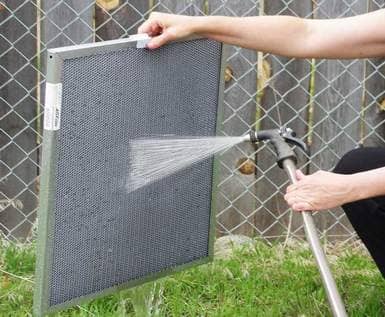Everyone should change their home’s air filters once every month (or more depending on your situation). It is a simple task that can have major benefits for your home’s air quality and your system’s efficiency. However, when buying an air filter there are several things that you should consider such as type, size and the filtration needs of your home. Every home is different, and each system configuration has different requirements for air filters.
The following is a basic run-down of some of the types of filters you will encounter:
- Fiberglass Filters – Also called “Mechanical” filters, these are the easiest to find and most readily available filters on the market. They are very cost-effective, meaning they don’t break the bank and are very easy to install. These filters typically have a MERV rating of 1 to 4 and only remove about 10 percent of pollutants. They also come at a depth of only one to two inches. Fiberglass filters are not ideal for filtering out high amounts of indoor contaminants. However, they do provide a high degree of airflow, which means that your system doesn’t have to work as hard to circulate air throughout your house. This can be particularly helpful for systems with small returns, and older systems which may be more prone to failure as time goes on.
- Pleated Filters – People who suffer from allergies may require this type of filter. Pleated filters are denser than fiberglass filters, trapping 30 to 45 percent of pollutants and particles. This is because they have more fibers per square inch than a standard fiberglass filter. As a result, they have a MERV rating of 10 to 13 and a price range of ten to fifteen dollars. While these filters do make a substantial dent in the amount of contaminants reaching your coil, they also restrict airflow, making them less ideal for low airflow returns. This ability to capture more particulates also means they require more diligent changeouts than the cheaper, high airflow filters.
- Electrostatic Filters – These filters use electricity to attract and trap particles before they reach your coil. Electrostatic filters are great at trapping larger particles like dust and debris; though, they are not as effective when it comes to smaller particles like smoke. These filters have a lifespan ranging from three to six months with a MERV rating of 12 to 16. Many of them are even reusable, thereby cutting down on replacement costs.
- HEPA Filters – HEPA stands for High Efficiency Particulate Air filters. These filters trap up to 97 percent of particles and allergens and have a MERV rating of 17 to 20. There is a pronounced downside to this type, though. With such a fine mesh for air to pass through, these filters can quickly clog and/or restrict airflow, which means higher heating and cooling costs for you as your system works harder to compensate. If you choose HEPA filters, it is very important that you change them frequently and consistently, and always check them for good air flow.
- Washable Filters – While often the most economical option, washable filters can be somewhat
counterproductive. With a MERV rating of only 1 to 4, they don’t prevent as many particles from passing through as other, higher rated filters. They actually work better when dirty, relying on the buildup of debris to restrict airflow and catch other particulates. Make sure you check them consistently for signs of mold and extreme blockages, cleaning only as often as needed to maximize airflow and prevent mold and other contaminants from slipping through.
A good rule of thumb when looking for a new filter is to do your research. Keep in mind that, as much as we want to block particulates, its equally important to not block your return and prevent your system from doing its job. For this reason, A/C professionals may also recommend UV lights or other forms of air purification, depending on the situation and the ductwork of your home. As always, if you aren’t sure what type of filter to purchase, contact a professional.
If you are curious about what filter is best for your system, or if you have any other questions about your unit and indoor air quality, call A/C Masters at 757-898-2894 or visit our website to schedule an appointment online.



